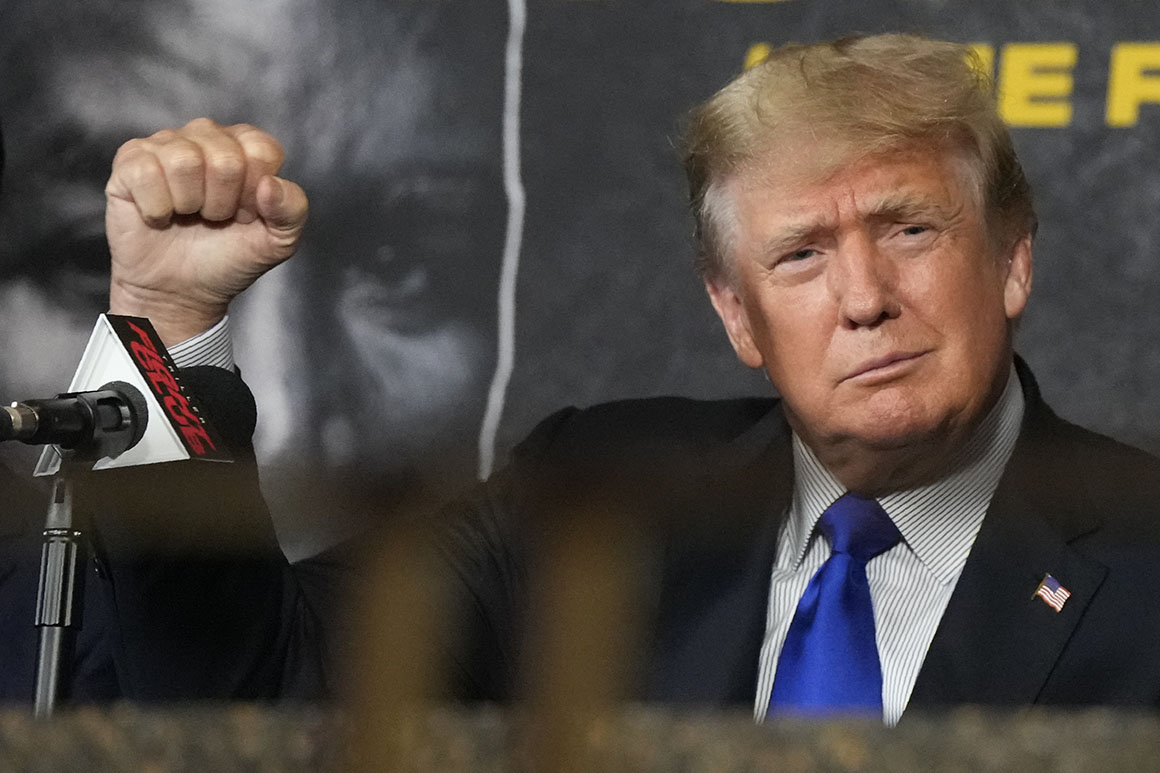House Minority Leader Kevin McCarthy, who’s kept Trump close as he presses a strong hand to win back the majority next year, said simply that “people should participate in their elections” when confronted recently with the former president’s warning that Republicans might stay home next fall or in 2024 without more attention paid to voter fraud assertions. McCarthy’s No. 2, Minority Whip Steve Scalise (R-La.), last month told Fox News that he saw problems with states’ administration of the 2020 election that were “not just irregularities.”
The GOP’s persistent embrace of debunked claims of widespread voter fraud, as well as the handful of Republican candidates seeking congressional seats after participating in “Stop the Steal” rallies, further underlines Trump’s continued hold on the party after some Republicans drifted away following Jan. 6. After Trump and other California Republicans laid the groundwork for evidence-free challenges to a Democratic victory in the California recall election earlier this year, at least one House Republican had suggested — before Tuesday’s election — that similar claims might be order in case of a loss by GOP nominee Glenn Youngkin in Virginia’s gubernatorial race.
In short, the party’s balancing act surrounding the 2020 vote and Trump’s influence isn’t about to end — despite Democrats’ interest in making 2022, and 2024, a referendum on the polarizing former president. And most conservatives aren’t too worried.
“We need to make sure that we’re getting to the bottom of some very abnormal, anomalistic, strange or irregular things that happened, so that we don’t have a repeat of that. We’ve got to have confidence in our election,” said Rep. Brian Babin (R-Texas), a member of the House Freedom Caucus.
The continued circulation of Trump’s fraud rhetoric has alarmed prosecutors and federal judges, who’ve described it as a harbinger of potential future Jan. 6-style violent episodes. Prosecutors have charged more than 650 people with breaching the Capitol during the pro-Trump insurrection earlier this year, with many defendants citing their allegiance to Trump as the reason they participated in the attack.
Some Republicans in the House, including stalwart conservatives, worry that Trump’s obsession with his loss in 2020 could burn the party in future races.
Rep. Dan Crenshaw (R-Texas) said that the former president’s message is “absolutely unhelpful“ when asked whether Trump’s statements were helpful as his party looks to retake the majority.
“When I talk to voters, I am very blunt with them. I say, ‘Stop being self-defeating. Get out and vote,’” Crenshaw added, after being asked about Trump’s statement. “‘You shouldn’t listen to anyone who tells you not to.’“
Illinois Rep. Adam Kinzinger, a member of the Jan. 6 select committee and the second House Republican who voted to impeach Trump to announce his plans to retire so far this year, called continued, baseless voter fraud claims “a really dangerous thing.”
“There’s still a significant amount of the country that believes the election was fraudulent. They truly believe — smart people, too,” Kinzinger said in an interview.
Yet Crenshaw and Kinzinger, with their different degrees of criticism, are in the minority of the party. Many Republicans have preferred to brush Trump’s rhetoric aside rather than reckon with it.
When asked about the fraud assertions, Rep. Tom Cole (R-Okla.) said: “I’ll leave it to the [former] president.”
It’s not just the repeated debunking of arguments that widespread voter fraud cost Trump the election, including a public one from his former attorney general, that could come back to bite Republicans. Many in the GOP vividly recall their narrow losses in two Georgia Senate runoffs that handed Democrats the upper chamber in January.
Those races, on the eve of the Capitol attack, came amid Trump’s furious barrage of alleged fraud in Georgia that he falsely claimed sank his campaign. Many Republicans quietly blame the former president’s rhetoric for the defeats, saying his messaging depressed the vote in the Senate runoffs by making some GOP voters feel their vote didn’t count.
Trump’s latest comment on voter fraud set off fresh alarms last month, when he warned that “Republicans will not be voting in ‘22 or ‘24” until “the Presidential Election Fraud of 2020” is solved. Top Republicans have privately fretted that Democrats only stand to gain from such statements that risk alienating their base.
“Look no further than the two Democrat senators from Georgia. Without Trump depressing the vote there, they would not have gotten elected,” said one senior Republican lawmaker, speaking candidly on condition of anonymity.
Another prominent House Republican described how some anger among the party’s base voters over the 2020 election appeared to be dying down before Trump’s most recent statements. Now, this lawmaker said, constituents are asking how members plan to deal with the 2020 election or to protect the next election, with some indicating they won’t vote if things aren’t sorted out.
A Trump spokesperson, asked about the former president’s most recent statements about voter fraud, highlighted a follow-up statement in which he said he “in no way meant to imply that I would tell [Republicans] not to vote, but rather that they may not have the incentive to vote if the election process is not fully remedied.”
Republicans’ election concerns have already spilled into GOP primaries, as candidates try to walk a line between engaging the pro-Trump base and trying to win a general election.
At last month’s Faith and Freedom Coalition Conference, two of the top Republican contenders in the North Carolina Senate primary split over allegations of fraud in 2020.
Both Rep. Ted Budd (R-N.C.) and former Rep. Mark Walker (R-N.C.) acknowledged Biden’s win, but Walker voiced concerns about “mass mailing of these ballots — who’s collecting them, who’s filling them in.”
Budd, a member of the House Freedom Caucus, has already received Trump’s endorsement.













































